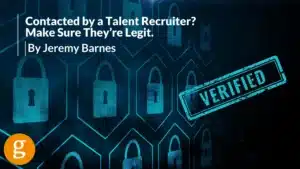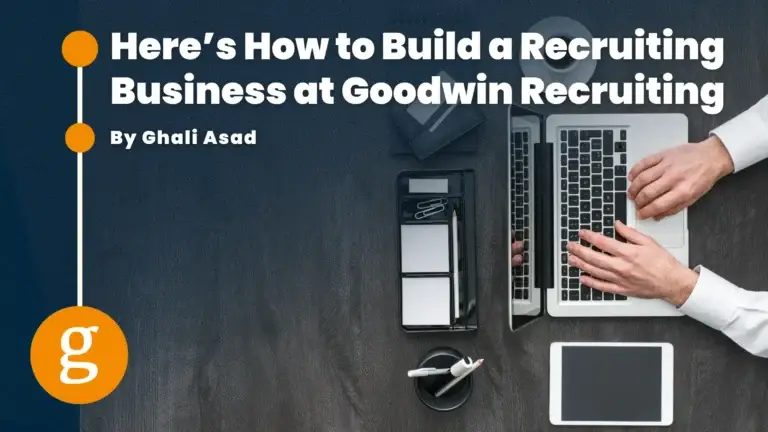Contacted by a Talent Recruiter? Make Sure They’re Legit.
Jeremy Barnes | Career Advice, Opinion | September 25, 2024

Not every recruiter who approaches job candidates is legitimate. Meaning, they may not be a talent recruiter at all, but rather someone pushing fake job offers with nefarious intentions.
In fact, recruiting scams are a real and ongoing issue. The prevalence of scams and phishing schemes in the world of talent recruiting has made job seekers increasingly hesitant to engage when they receive communications from a legitimate recruiter, and believe me, we’re equally concerned on your behalf.
“Scammers are lurking on LinkedIn and other job sites, posing as ‘recruiters’ for well-known companies. But instead of looking to hire you, they’re really looking to take your money and personal information.” – U.S. Federal Trade Commission (FTC)
As a senior recruiting partner with Goodwin Recruiting, I’d like to share solid information to make you aware of this growing concern and how you should respond (or not) if you’re contacted by a recruiter.
Trust your instincts – and verify
If you receive a message or email from a recruiter and it gives you pause, trust your gut, slow down, and do some fact checking. The information you obtain through quick research will generally either quiet your fears or possibly increase your skepticism.
How can you investigate a recruiter to confirm they’re legit? Following are several key things you can do to identify scammers and see their red flags – or confidently confirm that you’ve been contacted by a legitimate recruiter with a real job offer.
1. Check the recruiter’s personal LinkedIn profile page
While not every recruiter is fully active on LinkedIn or other job boards, most reputable recruiters have 500+ connections and a job history that matches the company they claim to represent. And at least occasionally, they post about job openings they are working to fill. Also, legitimate recruiting firms often provide their team members with professionally branded company banners for use on their LinkedIn profile pages. Look for these affirming details and apply the same principles to any job site.
2. Check the recruiting company’s website
I don’t recommend clicking links embedded within a message or email from anyone whose name you don’t recognize or that you suspect might be a scammer – and the same applies to a recruiter. Instead, do a quick Google search for the recruiter’s name and the company name they provide. Do they have a professional presence on the web? Do they have a company social media profile? If you can’t quickly and independently find the recruiter who contacted you, or the company they claim to represent, this is a sign to exercise caution.
3. Check the Better Business Bureau (BBB) website
If you find a recruiting company website but it doesn’t immediately put you at ease, you can also look at their Better Business Bureau profile and rating. Goodwin Recruiting has been in business for 25 years and maintains an A+ rating with the BBB. Even the best companies, in any industry or sector, will likely have a few complaints here and there – but the absence of a BBB profile or an excessive number and pattern of complaints in a company’s BBB profile should give you pause. The BBB says if there is no company profile, it can mean the business is not eligible to be BBB Accredited, has not applied, has applied but doesn’t meet BBB Accreditation Standards, or has decided not to apply.
4. Look closely at the email address
While there are some legitimate recruiters who run one-person agencies that may not have established a professional web presence yet, these are a minority. Therefore, if a recruiter contacts you via email, confirm that their e-mail address reflects the domain name of the company they claim to represent (i.e., @goodwinrecruiting.com) – rather than the domain of a free email service, such as Gmail or Yahoo. If the domain in the email address doesn’t match the company name, consider this a red flag.
5. Take the conversation to a phone or video call
Many scams are built around using text messages, private messages on social media, and email. If you’ve taken the above steps but still have concerns about a recruiter who contacted you, ask them for a phone call, or better yet, a video call. It is next to unheard of for scammers to be willing to get on the phone and especially on camera with a job candidate, much less provide proper details about a job opportunity. However, if they agree, ask specific questions on the call about the company, the position and job description, the salary, etc. Again, scammers pose as recruiters for known companies.
Pay attention to what they request from you
Let’s say you performed the basic investigation steps above and you’re relatively confident about engaging with the recruiter. Don’t let your guard down quite yet. One of the most telling things about the legitimacy of a recruiter is found in the nature of the information they solicit from you.
Here are some of the most common legitimate – and illegitimate – things that candidates are asked to provide:
- Resume and contact information: Recruiters use a variety of platforms to find job candidates, and those platforms don’t always provide access to a candidate’s full resume, phone number, or email. It is completely legitimate for a recruiter to ask for these things. Remember, most of your work history is posted on your LinkedIn page or other job site, and your contact information is generally available through online directories. So, in giving the recruiter your resume, there’s little chance that you are giving them information they can’t access on their own. As an aside, if your mailing address is reflected on your resume, consider removing your street address and keeping only your city and state.
- Personally identifiable information: I do not recommend providing a recruiter with anything beyond your resume and contact information prior to an interview. Period. However, once you have met the recruiter, established some trust, and feel like the position is a good fit for you, they may need additional information. Some recruiting agencies use software that requires a birth month and day (not year) or the last four digits of a social security number to identify a job seeker’s candidacy and prevent duplicate profiles. At Goodwin Recruiting, our process does not use either of these pieces of information, but there are reputable recruiting firms that do. If this causes you concern, ask the recruiter if you can use a random four-digit number instead of the last four of your social. For most companies, this is acceptable (provided you can remember that number in the future). You may also be asked for your address, as many hiring companies consider the commute to the workplace in their hiring decisions.
- Payment, bank account information, or any exchange of services: Talent recruiting services are paid for by the company that hires you. There is no valid situation I’m aware of that requires a job candidate to pay money to a hiring company, or for a hiring company to send money to a candidate (which might involve providing bank account information). Any proposed circumstance that involves money changing hands is a scam. If you encounter this, do not engage any further, block the person, and report them immediately to platform administrators and especially the FTC.
Be informed and trust your instincts
Something I’ve learned since becoming a talent recruiter is that there are things I would have considered a bit suspect as a job seeker, but that I now know are completely legitimate. For example, I didn’t understand confidential job searches or why a company wouldn’t disclose their brand name in a job posting (see my blog about Why Companies Post Confidential Jobs). And I certainly wouldn’t have thought it was acceptable to be asked for the last four digits of my social security number.
I hope this article has given you deeper insights into how to recognize fake job offers and bad actors posing as talent recruiters. Do your due diligence when a recruiter messages you, and once you’re armed with relevant information, trust your gut. It’s far better to miss a job opportunity by being cautious than to get scammed.
Feel free to contact me if you would like to explore genuine job opportunities that are available through Goodwin Recruiting. I’d be honored to support your career and job search!
Additional Resource: Learn what companies and their employees are doing to avoid evolving phishing attacks.
Share This Article














































